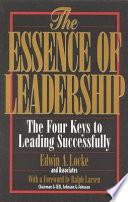
Leaders and Leadership in Education
Leadership within educational settings is widely regarded as essential for organizational effectiveness and the improvement of learning outcomes. Through an extensive review of theory and practice, Helen Gunter explores the contested field of leadership studies. She describes and critiques the different contributions made by · education management · school effectiveness · school improvement · critical studies. Leadership is examined as function, as behaviour and as leadership relationship, from students as leaders, through to headteachers. The author provides an up-to-date review of current thinking about leadership, which challenges the reader to engage wit
- ISBN 13 : 9780761954934
- ISBN 10 : 0761954937
- Judul : Leaders and Leadership in Education
- Pengarang : Helen Gunter,
- Kategori : Education
- Penerbit : SAGE
- Bahasa : en
- Tahun : 2001
- Halaman : 198
- Google Book : http://books.google.com/books?id=u0w06Tvfoz8C&dq=intitle:Leadership&hl=&source=gbs_api
-
Ketersediaan :
Through an extensive review of theory and practice, Helen Gunter explores the contested field of leadership studies.









